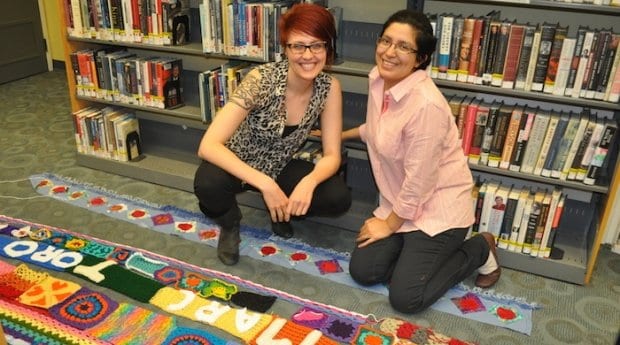For the first time since its start in 1996, Toronto’s Dyke March route is changing significantly.
Past years have seen hundreds of women walk west on Bloor Street, south on Yonge Street and east on Carlton Street to end their march in Allan Gardens. This year, the march will be reversed. Marchers will start in Allan Gardens, head west on Carlton Street, north on Yonge Street and east on Charles Street to end in George Hislop Parkette.
“The change made not only logistical sense, but also keeps focus on building community and maintaining the Dyke March as a radical, political demonstration,” says Laura Krahn, one of the lead organizers.
“It is symbolic of how the Dyke March is, in fact, a march, not a parade. It goes in the exact opposite way of the Pride parade,” adds Dallas Barnes, co-lead of the Dyke March team.
Organizers expect WorldPride to attract 5,000 women to the festivities on Saturday, June 28. Allan Gardens offers the much-needed space to organize marchers and to set up a stage worthy of the impressive lineup of rally speakers beforehand, they say. “Allan Gardens will provide a great sense of truly gathering together as a community — it’s like launching the march from one big, dyke picnic,” Krahn says.
Dyke day will begin at 1:30pm on June 28 with a rally in Allan Gardens. Participants are encouraged to gather earlier to create signboards, make friends and take in the Pride programming happening in the park. The march kicks off at 2pm and ends with a performance by the taiko drumming group Raging Asian Women in George Hislop Parkette.
The first Toronto Dyke March took place in 1996; three years earlier, the Lesbian Avengers organized what is recognized as the first official dyke march, in Washington. The group formed in the early 1990s to combat lesbian invisibility in queer activism. To get back to these political roots, the Toronto Dyke March has been rebuilding since the radical “Take Back the Dyke” march in 2010. At the time, community members organized the alternative march to resist Pride Toronto’s ban of the term “Israel apartheid” and the corporate cooptation of the Pride festival. Since then, the Dyke March has been committed to keeping this political spirit alive.
“The march is a reminder that our work is not done,” says Krahn. “It is both a celebration of our accomplishments over the past year and also reminds and energizes us for all the work still ahead.”
The Dyke March committee is also running Craft Action TO, a craft circle that meets weekly to knit, crochet, cross stitch and sew the 2014 Dyke March banner.
Dyke March organizers will host their annual party and fundraiser on June 13 at the Gladstone Hotel. In keeping with the crafting theme, the event is called Beer Craft, with the tagline “A craft circle. With beer.” Attendees can expect to hear poetry and prose written and read by local women, followed by a dance party.

 Why you can trust Xtra
Why you can trust Xtra


